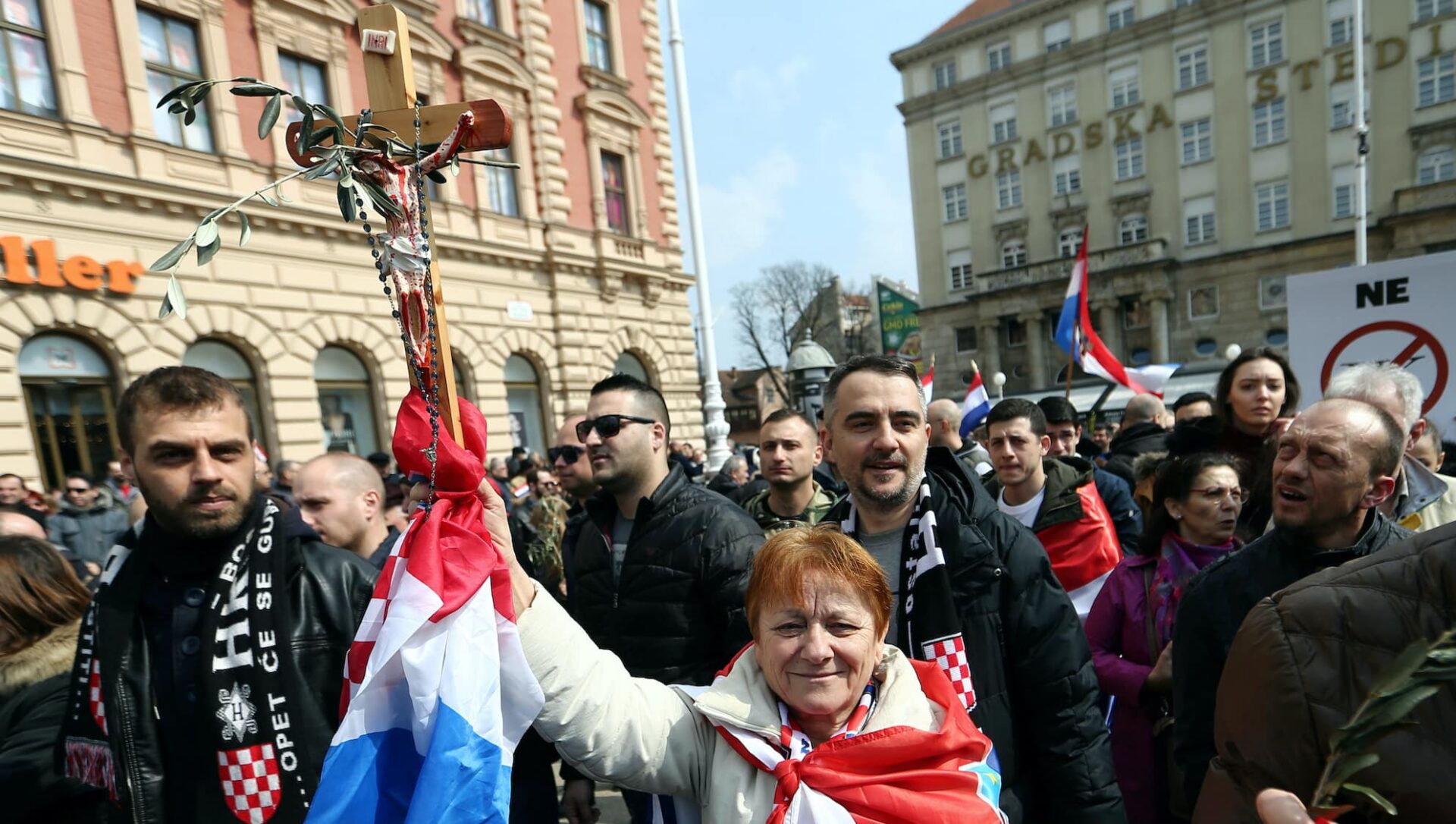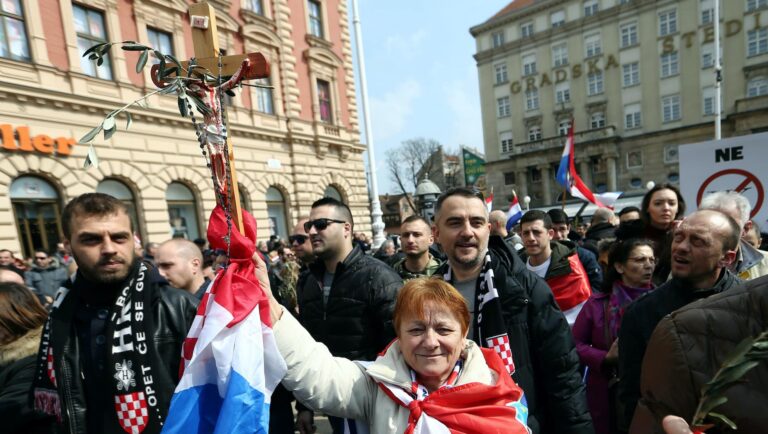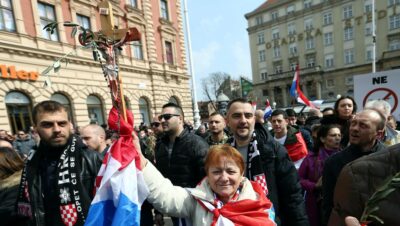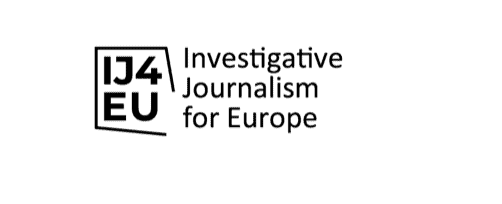In Lithuania, ultra-conservative organisations received state funding while the country’s parliament has once again postponed the ratification of the Istanbul Convention. The most influential ultra-conservative think tank in Estonia planned to launch Ordo Iuris branch before a referendum on definition of marriage.
As Poland’s Ministry of Justice is looking for allies to build an ultra-conservative bloc in the region, Polish Ordo Iuris is developing its network in Central Europe – an alliance with partners that spans Lithuania, Slovakia, Czechia and Hungary – and co-founding organisations in Estonia and Croatia. In Croatia, much as in Poland, ultra-conservative movements are trying to pressure the government to abandon the convention against domestic violence, although it has already been ratified.
1.
In September 2019, Varro Vooglaid, an Estonian lawyer, posted a photo taken in southern Poland on his Facebook feed. In the photo, a smiling Vooglaid is standing on an observation deck next to Jerzy Kwaśniewski, head of Poland’s Ordo Iuris. In the background, we can see a panorama of the Beskidy mountain range.
“Our negotiations with Ordo Iuris, which is doing a great job fighting against the ideological invasion in Poland, have produced results. We agreed that we would jointly create a similar centre in Estonia,” wrote Vooglaid, head of the Foundation for the Protection of Family and Tradition (SAPTK). The Estonian branch of TFP was co-created in 2012 by the Kraków-based Skarga activists who also happen to be the founding fathers of Ordo Iuris.
On the same day when Vooglaid’s post shows up, the ordoiuris.ee domain is registered. Vooglaid plans to create a think-tank of conservative lawyers who, much like Poland’s Ordo Iuris, will deal with ‘strategic litigation’.
The Estonian branch of Ordo Iuris was to be registered in the summer of 2020 – just in time for the referendum on the definition of marriage in Estonia’s constitution, originally scheduled for spring 2021 (aiming at, of course, future obliteration of the same-sex civil unions). However, a corruption crisis hit the country’s government and the referendum has been postponed, it seems, indefinitely.
Estonia, which ratified the Istanbul Convention in 2017, has a small Catholic community of around 6,000 while 65 percent of the population declare themselves as atheists. Already at that time, Objektiiv.ee, a SAPTK news website, supported Estonia’s Conservative People’s Party (EKRE) in its opposition against the decision to ratify the convention.
Varro Vooglaid comes from a traditional Catholic background. His family founded an association that runs a Catholic school in Tallinn and the think-tank Elukultuuri Instituut (“Life Culture Institute”). In 2008, the Institute made headlines when it launched Abort.ee, a website that ran a campaign against contraception. Abort.ee is no longer active – the idea of the think tank collapsed, but for its creators, it became a gateway to playing a more active role in global ultra-conservative networks.
One of the founders of Elukultuuri Instituut, Maria Madise (Vooglaid’s friend) made a stunning career in the European pro-life movement. Since 2014, working from London, she has coordinated the activities of the Society for the Protection of Unborn Children, the oldest and, as Madise herself has said, ‘Europe’s most radical anti-abortion organisation’. As a representative of SPUC, Madise also coordinates the Voice of the Family network – a global coalition of twenty pro-life organisations and also frequently participates in conferences organised by Ordo Iuris. In 2018, at a press conference, Madise commented on the amicus curiae opinion prepared by Ordo Iuris for the Polish Constitutional Tribunal: “The recent brief to Polish Constitutional tribunal is a wonderful example of setting the full truth of the sanctity of human life from the moment of conception before a legal body that can restore the authentic human rights in the society,” she said.
Seven organisations, which are a part of the Voice of the Family network, signed the international version of this opinion, which Ordo Iuris sent to the Polish Constitutional Tribunal a few days before the abortion ruling.
2.
2019 was an important year for the expansion of ultra-conservative lawyers from Poland. A few months before the meeting with their partners from Estonia, Ordo Iuris officially registered a subsidiary in Croatia, which finalised its contract with the Croatian foundation Vigilare. The mechanism was similar – first, Kraków-based Skarga activists set up a local branch of TFP (Vigilare), then an equivalent of Ordo Iuris emerged. Vigilare, a copy of Poland’s Skarga Foundation, was established in 2016. It started as an entity working with the local association of the same name. A similar role to Vooglaid in Estonia was played there by John Vice Batarelo, head of the NGO Vigilare – a prominent activist among Croatian conservatives.
The preparations took longer – the domain of the Croatian Ordo Iuris had been registered back in mid-2017. The Polish Ordo Iuris transferred its know-how to the Croatian branch while Batarelo incorporated his contacts among prominent activists of the Croatian right-wing. Hardly Vigilare was launched when Batarelo started cooperating with Stjepo Bartulica, currently a member of the nationalist movement Domovinski pokret (‘Movement for the fatherland’), which in 2020 won 13 seats in the Croatian parliament. By 2020 Bartulica is already seniored in Croatian politics: until 2015 he served as an advisor to the then-president of Croatia, Ivo Josipović, and then to a former prime minister. Also, Bartulica is the president of the organisation Center for Renewal of Culture. Since 2014, Bartulica’s Center and Vigilare co-organize a cyclic event that later became Tradfest, an annual international gathering of traditional and conservative leaders attended by Croatia’s politicians as well as TFP and WCF activists. They were united not only by their political activities – since 2009, but Batarelo and Bartulica had also been running a joint consulting company (liquidated in 2016).
Croatia’s radical conservatives scored their biggest success in 2013 when a referendum initiative on the constitutional definition of marriage was held, defining marriage as “a life community between a man and a woman” (SAPTK would like a similar definition to be adopted in Estonia). Few days before the referendum, Croatian MEP’s got a letter signed by 77 organizations calling them to “safeguard and strengthen the most basic institutions of human civilization: marriage and the natural family.” The letter was signed by Alexey Komov, Pavel Parfentiev, Aleksander Stępkowski (at that time President of Ordo Iuris), and Ignacio Arsuaga among others. (We describe some of these signatories in part 4 of the report).
The result of the referendum was a joint success for Vigilare and In the Name of the Family, an initiative launched by Željka Markić, one of Croatia’s most influential conservatives. The two organisations have been working closely ever since.
Markić is a regular guest of conferences and events organised by Ordo Iuris and politicians of Solidarna Polska (the party’s leader, Poland’s minister of justice, filed a motion to terminate the Istanbul Convention). ‘In the Name of the Family’ is among the official partners of Ordo Iuris. The former organization runs the Narod.hr website, which plays a similar role for Croatia’s Ordo Iuris as PCh24.pl for Poland’s Skarga activists. The website is always open to conservatives, striking an amicable tone in its reporting. It also boasts a huge reach – 1.39 million views per month in a country of 4.5 million.
Members of Ordo Iuris Croatia supervisory board include John Vice Batarelo, Jerzy Kwaśniewski, and Tymoteusz Zych, who both represent Poland’s Ordo Iuris. One of the faces of the Croatian organisation is Filip Đekić, a lawyer and one of the initiators of “40 dana za život” (“40 days for life”), a happening that involved standing in front of the hospitals and praying for unborn children.
The Croatian diaspora (associated with the radical right) also promoted this campaign in Germany. This is how Tomislav Čunović, a pro-life lawyer from Frankfurt, found his way to the Croatian Ordo Iuris, who in 2015 founded the German branch of “In the Name of the Family”, and two years later organised “40 days for life”. Yet officially, “40 days for life” in Frankfurt was organized by Germany’s DVCK – yet another satellite entity that can be linked to TFP network. DVCK is headed by Matthias von Gersdorf, the founder of Poland’s Piotr Skarga Institute.
Čunović, an activist who initially was active mainly in the Croatian minority in Frankfurt, made a striking career – he then became vice president of Vigilare before becoming head of Croatia’s Ordo Iuris.
Ivan Prskalo, who was a member of the team at the Croatian Ministry of Family, dealing with the ratification of the Istanbul Convention, is also active in the Croatian Ordo Iuris. Croatia finally ratified the anti-violence convention in 2018 – in protest, some MPs from the parliamentary majority joined the radical right. The government insisted that the document does not imply any legal obligation to recognize a third sex or redefine the constitutional definition of marriage – referring to anti-convention narrative pushed by ultra-conservatives. So along with ratifying the Istanbul Convention, the parliament also adopted a statement which states that the purpose of the convention is protection of women against any form of violence, that its provisions do not contain any obligation to introduce ‘gender ideology’ in Croatia’s legal and education system, and that the convention is in line with Croatian constitutional provisions, notably those concerning protection of human rights and fundamental freedoms.
Yet, in September 2020, representatives of “The Truth About the Istanbul Convention” (“Istina o Istanbulskoj”) demanded that the petition on the referendum to terminate the convention should be reconsidered – the first attempt failed when the signatures were examined, some of them turned out to be invalid. The campaign against the convention was championed by the Church and conservative organisations headed by “In the Name of the Family” and “Vigilare”.
Although the actions of Croatia’s ruling party (HDZ) helped ratify the convention, the country’s government has not unequivocally declared whether it is considering a Polish proposal to replace the convention with a new draft. We didn’t get any answer for our questions about Croatian reply to the letter from Polish Ministry of Justice.
3.
When the stopgenderconvention.org campaign is launched in June 2020, Slovak partners of Ordo Iuris, who include Patrik Daniska (HFI) and Andrej Ralbovský from Slovakia Christiana (an organization established by Kraków-based Skarga activists in 2016) attend the event alongside Croatia’s Željka Markić.
Two months later, in August 2020, the Slovak Ordo Iuris is registered using Ralbovský’s home address. The domain ordoiuris.sk had been registered by Ralbovski’s company already in 2017 (at a similar time as the one in Croatia), is not yet operational. In September 2020, the Slovak Ordo Iuris opens a Facebook profile, where it boasts about the achievements of the Polish organisation.
The domains registered by Ralbovský also include kontrevolucia.sk, apostolat.sk novena.sk – names that might be related to Skarga activists, as well as domains sodomskypaskvil.sk, homoloby.sk, milicia.sk, kolaboranti.sk and grevio.sk (most likely a reference to a group of experts at the Council of Europe called the Group of Experts on Action against Violence against Women and Domestic Violence). Ralbovský, unlike Vooglaid in Estonia, Batarelo or Markić in Croatia, is not widely recognised among Slovakia’s right-wing.
When journalists of the Investigative Centre of Jan Kuciak called Ralbovský’s number, an unidentified voice said that “Ralbovský cannot be reached on this number”. The man also told us that should we have any questions, we can reach Ralbovský by email.
“I have not been involved in activism for a long time and I am not a public person, so I ask that you respect my privacy” – this was Ralbovský’s reply to our emailed questions about Ordo Iuris in Slovakia. He explained that he was no longer the association’s chairman. “Due to the difficult pandemic situation, it has not yet been possible to complete all the formalities and enter these changes in the register,” he added. According to the official documents Ralbovský has been the chairman of Slovak Ordo Iuris to these days (April 2021). Despite the pandemic, the register of civic organizations of the Slovak Ministry of Interior is able to process the changes without any delays in other cases known to the ICJK.
In March 2021, the Slovak branch of Ordo Iuris also registered the Institute of Legal Culture Ordo Iuris trademark. Interestingly, back in 2019, so at the time of Ordo Iuris’ international expansion, Slovakia Christiana Foundation (established by Skarga Foundation) already tried to register the Ordo Iuris trademark, but the Industrial Property Office rejected the application.
The Slovak Republic was one of the first countries to sign the Istanbul Convention – Bratislava did so in May 2011. The authorities officially declared that the convention would be ratified by the end of 2013.
That never materialised. The Istanbul Convention was sidelined by prime minister Robert Fico, who since the elections in 2016, has been trying to attract conservative voters. After the European Parliament adopted the Istanbul Convention in September 2017, the marches and petitions were organised to put pressure on the Slovak government to withdraw from the convention.
“When I am prime minister and doubts in interpreting the controversial provisions of the Istanbul Convention are not resolved, unless the provisions of the convention are fully consistent, in particular with the definition of marriage as a union between a man and a woman, I will never consent to the government submitting this convention for ratification. Never,” Fico declared before its resignation in 2018.
In spite of the fact that the liberal candidate Zuzana Čaputová won the 2019 presidential elections, in February 2020, the National Council of the Slovak Republic rejected the convention.
4.
Although Lithuania’s minister of foreign affairs Linas Linkevičius signed the Istanbul Convention already in 2013, it has not been sent to the country’s parliament.
Dovilė Šakalienė, MP who several years ago represented the Peasants’ and Greens’ Union, has already submitted the document to be ratified by the Seimas six times. Every time she did so, the draft failed to be included on the parliament’s agenda. Even the leaders of her former party, who back in 2016 posed with posters that supported the convention, shifted to an opposite stance: now, they’re among the fiercest critics of the convention.
“Most of my colleagues decided that the strange conspiracy theories that the convention was aimed at introducing new genders, or posed a threat to the traditional family values, are not ungrounded or they just feared they would lose votes” says Šakalienė, who eventually left the party.
As in other Central European countries, the Istanbul Convention became a controversial issue in Lithuania because of the definition of gender. Opponents have argued that the adoption of the document will introduce more genders, contribute to the collapse of the traditional family and revolutionise the country’s entire legal system.
On 4 March 2021, the Istanbul Convention was not included on the agenda of the plenary session despite previous plans. That means its introduction will be further postponed until, at least, the autumn. “Now, after such a big discussion has been brewing and, it seems, having a record number of people who read it [the convention], I think we can give some time for preparations,” the parliament’s chair Viktorija Čmilytė-Nielsen said.
The decision to postpone the hearings was taken after a massive outrage sparked by a celebrity priest and a think-tank that collaborates with Polish Ordo Iuris. The proponents of the delay even enjoyed partial backing from the country’s president.
Two organisations were among the strongest opponents of the convention. They included the Free Society Institute (LVI) and the National Association of Families and Parents (NŠTA). LVI is an official Lithuanian partner of an international petition launched by Ordo Iuris (it also sponsored another petition in Lithuania). Its petitions were widely shared across allied organisations and social media.
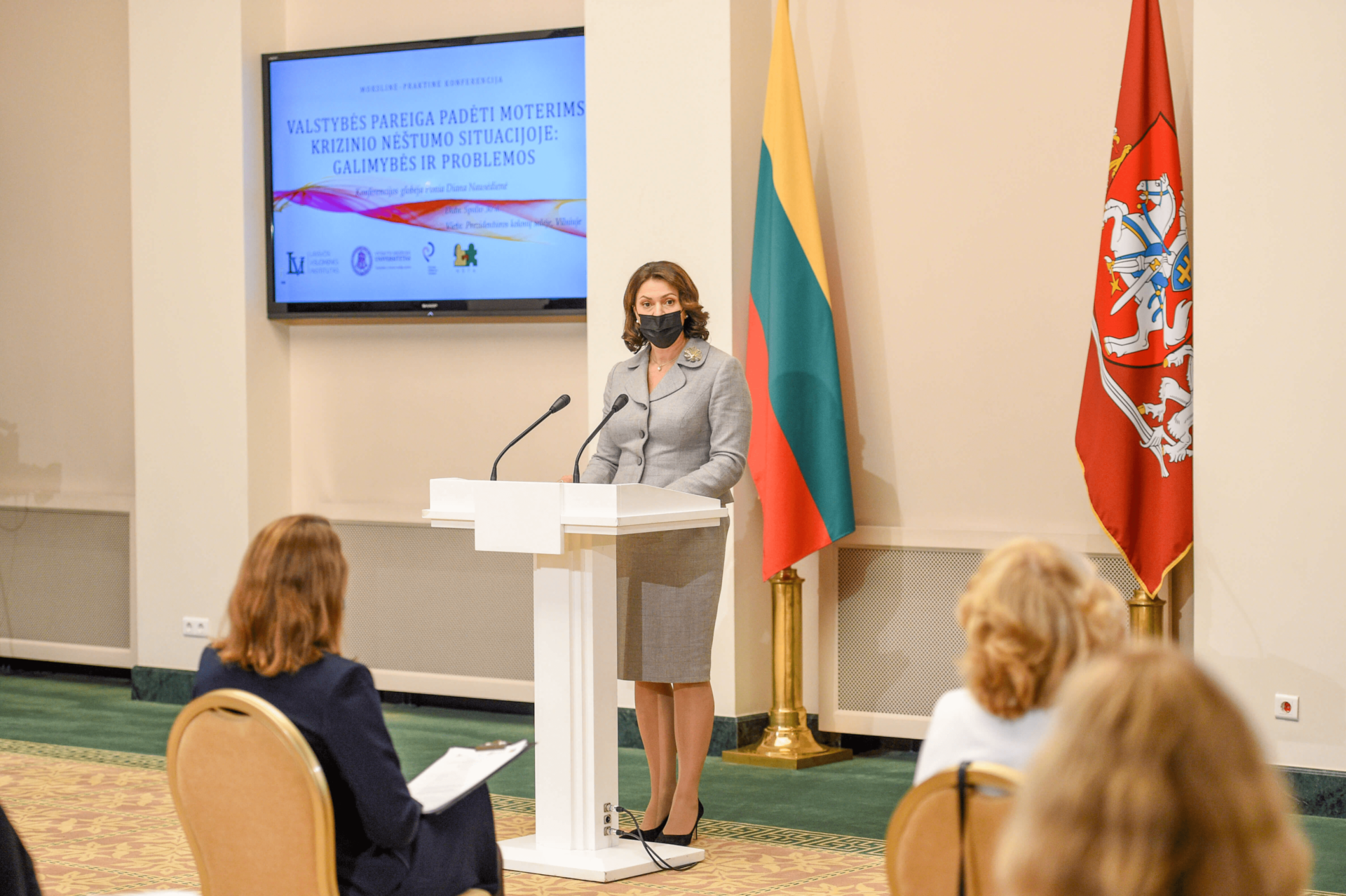
First Lady Diana Nausėdienė speaking at the LVI event (credit: Robertas Dačkus
LVI has been endorsed by Lithuania’s first lady, Diana Nausėdienė. Last October, she was the patron of an event on ‘critical pregnancies’ organised by LVI that was held at the presidential palace. President Nausėda himself, before he became a presidential candidate, had given a widely discussed interview to LVI, where he backed the institute’s conservative agenda on abortions and ‘normal family’.
President Nausėda also intervened when the convention began to kick up some dust. After a celebrity priest Algirdas Toliatas shared petitions by LVI and NŠTA, he received a lot of criticism, including rude comments from popular influencers. Toliatas said his freedom of speech was under attack. Several days later, president Nausėda claimed he ‘stands with Toliatas’.
The associations of Lithuania’s LVI think-tank also stretch to the country’s parliament. One of LVI’s founders and leaders, Kristina Zamarytė-Sakavičienė is an aide to Agnė Širinskienė, one of the most influential members of Lithuania’s Peasants’ and Green’s Union that ruled the country between 2016 and 2020. Širinskienė, currently in the opposition, is an active backer of the movement against the Istanbul Convention.
Sceptics of the Istanbul Convention can also be found among the ruling coalition. Vilija Aleknaitė-Abramikienė, a member of the ruling Homeland Union’s, chairs the parliamentary group ‘For Family” that brings together 35 Lithuanian MPs. Until recently, one of LVI’s founders Ramūnas Aušrotas had served as an aide to Aleknaitė-Abramikienė. His former boss was a keynote speaker at a recent LVI’s event that promoted ‘natural human rights’ as a key to Europe’s future. The list of attendees included a significant presence of Polish conservatives and Paul Coleman, the executive director of the Alliance Defending Freedom (ADF) International.
LVI’s sources of funding come from private donations, organisations affiliated with the Catholic Church. The organisation also receives some state funding.
An investigation by journalists from Siena.lt revealed that between 2018 and 2020 a group of conservative NGOs (which included LVI, NŠTA and their partners) received a total of 180,000 euros. The funding was awarded for a project that aimed at improving the representation of families in Lithuania’s politics.
The project sparked controversies for multiple reasons but mostly because some of the public money was used to attend the World Congress of Families in Verona – a controversial event linked to people and organisations that align themselves with the Kremlin’s interests.
The project was dubbed ‘AŠIS’ (‘AXIS’ in Lithuanian). Its key partners included several organisations that promote a conservative agenda. Its principal partner, NŠTA, was also campaigning against the Istanbul Convention.
Other members of the project included at least two organisations with ties to a party that held power in Lithuania at that time. Pro Patria, a far-right movement connected to the country’s branch of Skarga activists (KKI) were part of the project in 2018 and 2019. At the time, Pro Patria leader Vytautas Sinica worked as an aide to Eugenijus Jovaiša, an influential member of the ruling Peasants’ and Greens’ Union. Pro Patria was asked, for instance, to conduct a study on sexual education, which was to be put together by no other than Sinica himself. Siena.lt asked NŠTA about Pro Patria’s qualifications to conduct such work but has not heard from the association.
The ‘AXIS’ project had yet another partner – it was LVI.
Some of the funding the project received was spent in March 2019 on a trip to Verona. The World Congress of Families in Verona was attended by two NŠTA delegates, including chairwoman Violeta Vasilauskienė. The Congress attracted Russian presence, including Alexey Komov, a close associate of Konstantin Malofeev, a Russian oligarch sanctioned after the Russian aggression in Ukraine. Ignacio Arsuaga, the leader of Spanish-based CitizenGo – an organization that was exposed asking for funding from Malofeev in a documentary called ‘Abortion: Backlash in Europe’ – also was present during the event.
Another prominent figure at the Congress included Matteo Salvini, Italy’s deputy prime minister at that time and leader of the Lega Nord. Shortly afterwards, it was revealed that the party wanted to obtain covert funding from Russia.
NŠTA provided no comments about the Verona event or the nature of spending of the ‘AXIS’ money. Instead, the organisations involved in a smear campaign against Siena.lt journalists. Two days prior to publication, Pro Patria and LVI publicized a conspiracy, claiming that the investigations involving their organisations are a ‘part of George Soros’ global agenda’.
In reaction to Siena’s findings, the Lithuanian Ministry of Social Affairs gave a statement: “The Ministry’s position is unambiguous – our assessment of such affiliations and meetings is negative. Such actions of organisations that receive state funding do not only undermine competitions [for state grants] but also discredit their ideas and goals. (…) We sincerely regret that after the 2018-2019 competitions were concluded, [it became clear] that individual organisations abused the trust by engaging in activities and cooperating with people and organisations that were not disclosed when grant applications were filed”, the ministry told Siena adding that in a new NGO funding round the requirements have been tightened to fight discrimination and hate speech.
Shortly after, LVI got the public grant again. Together with NŠTA and other partners, they will split another 54,000 euros to “strengthen the representation of families” in Lithuania. The ministry of social affairs explained that there were “no other umbrella organizations in this sector” that applied for funding.
This report is part of the cross-border investigation conducted by an international team of journalists:
Anna Gielewska, Julia Dauksza, Konrad Szczygieł (Fundacja Reporterów, Poland)
Šarūnas Černiauskas, Miglė Krancevičiūte (Siena.lt, Lithuania)
Tomáš Madleňák, Peter Kapitán (Investigative Center of Jan Kuciak, Slovakia)
Oliver Kund (Ekspress Meedia, Estonia)
Mašenjka Bačić (Croatia)
Márton Sarkadi Nagy (Átlátszó, Hungary)
Cover photo: A woman holds a cross during the protest against the ratification of the Istanbul Convention in Zagreb, Croatia, March 24, 2018. Source: ANTONIO BRONIC / Reuters / Forum
The production of this investigation was supported by a grant from the Investigative Journalism for Europe (IJ4EU) fund.

